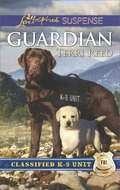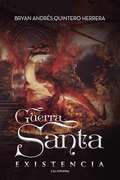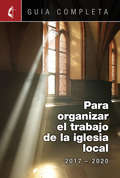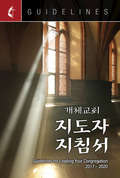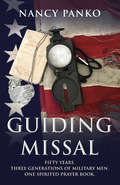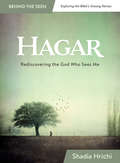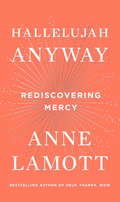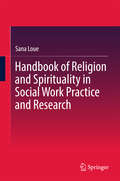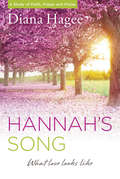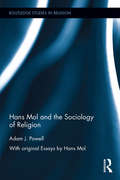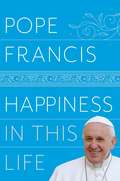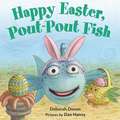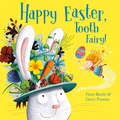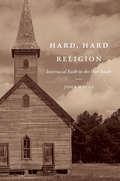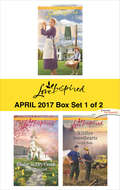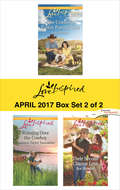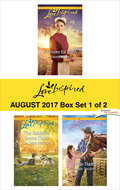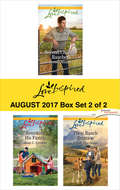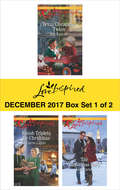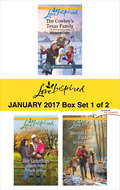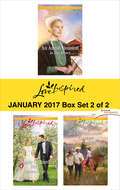- Table View
- List View
Guardian: Protection Detail Duty Bound Guardian Trail Of Evidence (Classified K-9 Unit Ser. #1)
by Terri ReedPROTECTING THE SINGLE MOM When a fellow FBI agent is kidnapped and a protected witness vanishes, Leo Gallagher will stop at nothing to find them both. So when he discovers a link between the case and a single mother in Wyoming, Leo and his trusty K-9 partner rush to question Alicia Duncan. Could she be the key to locating the missing persons? Not if a killer has anything to say about it. Someone is determined to keep Alicia from talking, so Leo and his chocolate Lab must keep her and her little boy safe on their family ranch. With danger lurking around every corner, Leo must work overtime to not lose another person who's important to him.
Guerra Santa: Existencia
by Bryan Andrés Quintero HerreraLas deidades también tienen ambiciones. <P><P>«Las historias de ángeles han sido oídas pero nunca descifradas. Los enfrentamientos entre el bien y el mal a través de los ángeles hacen parte fundamental de este libro extraño pero vigoroso, que rompe esquemas tradicionales de narración y llega como lanza de arcángeles y querubines al corazón de los lectores jóvenes que buscan entrar de lleno a la verdad. Es para leerlo y sorprenderse».Gustavo Álvarez Gardeazábal.
Guia Completa Para Organizar el Trabajo de la Iglesia Local 2017-2020: Guidelines for Leading Your Congregation 2017-2020 Spanish Ministries
by Julio GomezWritten completely in Spanish, this book gives guidance designed to support the ministries of The Hispanic United Methodist Church.
Guidelines for Leading Your Congregation 2017-2020 Korean
by Dal Joon WonWritten completely in Korean, this book gives guidance designed to support the ministries of The Korean United Methodist Church.
Guiding Missal: Fifty Years. Three Generations of Military Men. One Spirited Prayer Book.
by Nancy PankoIn 1944, a U.S. Army baker volunteers as a forward observer to carry out covert operations behind German lines in World War II. In the early 1960s, a focused nineteen-year-old Airman is responsible for decoding critical top secret messages during the height of the Berlin Crisis. In 1993, an army sniper overcomes a debilitating condition only to fight for survival in the streets of war-torn Mogadishu, Somalia, when a Blackhawk helicopter is shot down. When each of these men face a crisis, this very special prayer book, My Military Missal, provides the comfort and encouragement of divine power. Based on actual events, Guiding Missal’s timeless journey of faith, patriotism and miracles will touch your heart as the missal and the men call out to God for guidance, protection, and a safe return home.
Guru Nanakdev
by Nalin Chhotalal Pandyaગુરુ નાનકદેવ એ નવજીવન દ્વારા પ્રકાશિત સંતવાણી ગ્રંથાવલિનું તેરમું પુસ્તક છે. સંતવાણી ગ્રંથાવલિ એ ભારતના મહાનુભાવોના જીવન અને વિચારને વાચક સુધી પહોંચાડવાનો નવજીવન ટ્રસ્ટનો નમ્ર પ્રયાસ છે.
Hagar: Rediscovering the God Who Sees Me
by Shadia HrichiYou are "The God Who Sees Me." Discover a close relationship with God—no matter the pain or suffering in your life. Witness the depths of God’s compassion through the eyes of Hagar, a runaway slave who meets the living God in a desert of despair, where she gives Him the name El Roi, "The God Who Sees Me." A largely forgotten Old Testament character, Hagar is actually one of only a few people who have ever spoken directly with the LORD. Through this seven week study, you will find that when you surrender your life into God’s hands, your trials and triumphs serve a magnificent purpose: to draw you into the arms of the faithful God who sees you.
Hallelujah Anyway: Rediscovering Mercy
by Anne Lamott<P>From the bestselling author of Help, Thanks, Wow and Bird by Bird comes a powerful exploration of mercy, its limitless (if sometimes hidden) presence, why we ignore it, and how we can embrace it. "Mercy is radical kindness," Anne Lamott writes in her enthralling and heartening book, Hallelujah Anyway. <P> It's the permission you give others—and yourself—to forgive a debt, to absolve the unabsolvable, to let go of the judgment and pain that make life so difficult. In Hallelujah Anyway: Rediscovering Mercy Lamott ventures to explore where to find meaning in life. We should begin, she suggests, by "facing a great big mess, especially the great big mess of ourselves." It's up to each of us to recognize the presence and importance of mercy everywhere—"within us and outside us, all around us"—and to use it to forge a deeper understanding of ourselves and more honest connections with each other. <P>While that can be difficult to do, Lamott argues that it's crucial, as "kindness towards others, beginning with myself, buys us a shot at a warm and generous heart, the greatest prize of all." Full of Lamott’s trademark honesty, humor and forthrightness, Hallelujah Anyway is profound and caring, funny and wise—a hopeful book of hands-on spirituality. <P><b>A New York Times Bestseller</b>
Handbook of Religion and Spirituality in Social Work Practice and Research
by Sana LoueThis singular reference explores religion and spirituality as a vital, though often misconstrued, lens for building better understanding of and empathy with clients. A diverse palette of faiths and traditions is compared and contrasted (occasionally with secularism), focusing on areas of belief that may inspire, comfort, or trouble clients, including health and illness, mental illness, healing, coping, forgiveness, family, inclusion, and death. From assessment and intervention planning to conducting research, these chapters guide professionals in supporting and assisting clients without minimizing or overstating their beliefs. In addition, the book's progression of ideas takes readers beyond the well-known concept of cultural competence to model a larger and more meaningful cultural safety. Among the topics included in the Handbook: Integrating religion and spirituality into social work practice. Cultural humility, cultural safety, and beyond: new understandings and implications for social work. Healing traditions, religion/spirituality, and health. Diagnosis: religious/spiritual experience or mental illness? Understandings of dying, death, and mourning. (Re)building bridges in and with family and community. Ethical issues in conducting research on religion and spirituality. The Handbook of Religion and Spirituality in Social Work Practice and Research is a richly-textured resource for social workers and mental health professionals engaged in clinical practice and/or research seeking to gain varied perspectives on how the religion and spirituality of their clients/research participants may inform their work.
Hannah's Song: What Love Looks Like
by Diana HageeJoin Diana Hagee in this insightful Bible study as she takes you verse by verse through the story of Hannah memorialized in 1 Samuel. Hannah endured heartache, frustration, and a deep feeling of inadequacy for being barren in a culture that honored motherhood. Still, she was a woman of patience, perseverance, and courage. Hannah cried out to God with absolute faith that He would hear her petition and answer it. Using Scripture, powerful storytelling, and real-life examples, this study will help you: Establish a foundation of Bible knowledgeSearch the Word for answers to everyday lifeChallenge yourself to dig deeper into the Bible individually or with a groupReflect on God's Word to understand His divine plan for you.Discover that God's Word is approachable, and it should be approached daily.Equip you to live the victorious, committed life of a believer. Hannah's story emphasizes the power of prayer, faith, and praise. Like Hannah, God has a divine plan for every woman. He will pour out His unconditional love on your life as you seek to serve and glorify Him.
Hans Mol and the Sociology of Religion (Routledge Studies in Religion)
by Adam J. PowellHans Mol was born in the Netherlands during the 1920s. His imprisonment by the Gestapo during World War II began a long intellectual journey, exploring the role of religion in society. His work on the sociology of religion throughout the 20th and 21st Century is distinctive in its quest for both methodological and existential balance Part One of this book includes a brief outline of Mol’s most influential theory as originally explicated in Identity and the Sacred (1976). This is followed by a look at the initial reception of that theory in relation to the competing concepts of Mol’s contemporaries. Part Two is comprised of four previously-unpublished essays written by Mol during the 70s and 80s. Covering topics from evolution to evangelicalism, the papers display the sweeping ambition of this sociologist as well as the tone and contours of his intellectual articulation. In the Postscript this volume concludes with select transcripts of interviews conducted between Adam Powell and Hans Mol during the Spring of 2012. This volume of Mol’s work will be of keen interest to academics and students with an interest in the sociology of religion post-World War II and the development of contemporary Christian theology.
Happiness in This Life: A Passionate Meditation on Earthly Existence
by Oonagh Stransky Pope FrancisA collection of homilies, speeches, and “messages of the day” that brings together Pope Francis’s wisdom on finding happiness in the here and now For Pope Francis, the appreciation of our everyday lives is a spiritual undertaking. Joy is a divine attribute, and creating joy around us an essential part of faith. Every homily and speech in this book delivers, in warm, engaging language accessible to believers and nonbelievers alike, a key lesson, instructing readers on finding love and happiness in a chaotic world. Along the way, Pope Francis discusses the sanctity of women’s rights, talks about how the love of sports can bring out our best qualities, and explains why fighting discrimination is the essence of loving thy neighbor. He shares personal stories and anecdotes from his life, provides comforting messages of hope, and discusses the ways flawed families can make you a better person. The core ideas of Francis’s papacy—mercy, support for marginalized people, and diplomacy—shine through.
Happy Easter, Pout-Pout Fish (A Pout-Pout Fish Mini Adventure #8)
by Deborah DiesenA short and sweet mini-adventure especially created to introduce the youngest guppies to the New York Times-Bestselling Pout-Pout Fish series.Hippity-hoppity, the pout-pout bunny is on his way! Toddlers will love swimming along with the pout-pout fish this Easter as he turns little pouts into big smiles. With just one line of text per page, this simple, 12-page board book will send Debbie Diesen and Dan Hanna's much-loved Pout-Pout Fish flippering and swishing into the hearts and minds of the youngest guppies.
Happy Easter, Tooth Fairy! (Tooth Fairy #4)
by Peter BentlyEveryone's favourite fairy meets everyone's favourite bunny in this rhyming Easter egg hunt!The Tooth Fairy helps the Easter Bunny hide eggs inside wellington boots, under logs and inside a wheelbarrow. All is set for the Easter egg hunt until one of the children loses their wobbly tooth! Will the Tooth Fairy come to the rescue?From the Winner of the Roald Dahl Funny Prize and the illustrator of the bestselling Dinosaur That Pooped books. The perfect Easter gift!Praise for The Tooth Fairy's Christmas: "Garry Parsons does both characters proud with his swirling, atmospheric illustrations." The Independent
Hard, Hard Religion: Interracial Faith in the Poor South (New Directions in Southern Studies)
by John HayesIn his captivating study of faith and class, John Hayes examines the ways folk religion in the early twentieth century allowed the South's poor--both white and black--to listen, borrow, and learn from each other about what it meant to live as Christians in a world of severe struggle. Beneath the well-documented religious forms of the New South, people caught in the region's poverty crafted a distinct folk Christianity that spoke from the margins of capitalist development, giving voice to modern phenomena like alienation and disenchantment. Through haunting songs of death, mystical tales of conversion, grassroots sacramental displays, and an ethic of neighborliness, impoverished folk Christians looked for the sacred in their midst and affirmed the value of this life in this world. From Tom Watson and W. E. B. Du Bois over a century ago to political commentators today, many have ruminated on how, despite material commonalities, the poor of the South have been perennially divided by racism. Through his excavation of a folk Christianity of the poor, which fused strands of African and European tradition into a new synthesis, John Hayes recovers a historically contingent moment of interracial exchange generated in hardship.
Harlequin Love Inspired April 2017 - Box Set 1 of 2: Her Secret Amish Child\Easter in Dry Creek\Wildfire Sweethearts
by Janet Tronstad Leigh Bale Cheryl WillifordLove Inspired brings you three new titles! Enjoy these uplifting contemporary romances of faith, forgiveness and hope.HER SECRET AMISH CHILD Pinecraft Homecomings by Cheryl WillifordReturning to her Amish community, Lizbeth Mullet comes face-to-face with her teenage crush, Fredrik Lapp. As he builds a bond with her son and she falls for him all over again, will revealing the secret she holds turn out to be their undoing—or the key to their happily-ever-after?EASTER IN DRY CREEK Dry Creek by Janet TronstadClay West is back in Dry Creek, Montana, to prove he’s innocent of the crime he was convicted for. But when he reconnects with old friend Allie Nelson, his biggest challenge will be showing her not only that he’s a good man—but that he’s the perfect man for her.WILDFIRE SWEETHEARTSMen of Wildfire by Leigh BaleAs a hotshot crew member, Tessa Carpenter is always ready to fight wildfire. Yet nothing could’ve prepared her for having her ex-fiancé as her boss. Sean Nash’s guilt over Tessa’s brother’s death caused him to end their engagement. Now he’s bent on getting back the love of his life.Join HarlequinMyRewards.com to earn FREE books and more. Earn points for all your Harlequin purchases from wherever you shop.
Harlequin Love Inspired April 2017 - Box Set 2 of 2: The Cowboy's Easter Family Wish\Winning Over the Cowboy\Their Second Chance Love
by Lois Richer Shannon Taylor Vannatter Kat BrookesLove Inspired brings you three new titles! Enjoy these uplifting contemporary romances of faith, forgiveness and hope.THE COWBOY’S EASTER FAMILY WISH Wranglers Ranch by Lois RicherWidowed single mom Maddie McGregor moved to Tucson, Arizona, for a fresh start with her son. She never expected Noah’s healing would be helped along by the former youth minister working at Wranglers Ranch—or that Jesse Parker could also be her hope for a second chance at forever.WINNING OVER THE COWBOY Texas Cowboys by Shannon Taylor VannatterWhen Landry Malone arrives in Bandera, Texas, to claim her inheritance of half a dude ranch, co-owner Chase Donovan plans to run her out and keep his family legacy. Landry is just as determined to show the cowboy she’s up for the challenge of running the place—and winning his heart.THEIR SECOND CHANCE LOVE Texas Sweethearts by Kat BrookesHope Dillan is back in Texas to help her ailing father recover. Making sure his nursery business stays afloat will mean working with Logan Cooper—the sweetheart she’s never forgotten. To embrace a future together, can she finally reveal the secret that tore them apart?Join HarlequinMyRewards.com to earn FREE books and more. Earn points for all your Harlequin purchases from wherever you shop.
Harlequin Love Inspired August 2017 - Box Set 1 of 2: A Groom for Ruby\The Soldier's Secret Child\Texas Daddy
by Emma Miller Jolene Navarro Lee Tobin McclainLove Inspired brings you three new titles! Enjoy these uplifting contemporary romances of faith, forgiveness and hope.A GROOM FOR RUBYThe Amish Matchmaker by Emma MillerJoseph Brenneman is instantly smitten when Ruby Plank stumbles—literally—into his arms. The shy mason sees all the wonderful things she offers the world. But with his mother insisting Ruby isn’t good enough, and Ruby keeping a devastating secret, could they ever have a happily-ever-after?THE SOLDIER’S SECRET CHILDRescue River by Lee Tobin McClainWidow Lacey McPherson is ready to embrace the single life—until boy-next-door Vito D’Angelo returns with a foster son in tow. Now she’s housing two guests and falling for the ex-soldier. But will the secret he’s keeping ruin any chance at a future together? TEXAS DADDYLone Star Legacy by Jolene NavarroAdrian De La Cruz is happy to see childhood crush Nikki Bergmann back in town and bonding with his daughter. But he quickly sees the danger of spending time together. With Nikki set on leaving Clear Water, could their wish for a wife and mother ever become reality?Join HarlequinMyRewards.com to earn FREE books and more. Earn points for all your Harlequin purchases from wherever you shop.
Harlequin Love Inspired August 2017 - Box Set 2 of 2: Second Chance Rancher\Reuniting His Family\Their Ranch Reunion
by Brenda Minton Jean C. Gordon Mindy ObenhausLove Inspired brings you three new titles! Enjoy these uplifting contemporary romances of faith, forgiveness and hope. SECOND CHANCE RANCHERBluebonnet Springs by Brenda MintonReturning to Bluebonnet Springs, Lucy Palermo is determined to reclaim her family ranch and take care of her younger sister. What she never expected was rancher neighbor Dane Scott and his adorable daughter—or that their friendship would have her dreaming of staying in their lives forever.REUNITING HIS FAMILYby Jean C. GordonReleased from prison after a wrongful charge, widowed dad Rhys Maddox wants nothing more than custody of his two sons. Yet volunteering at their former social worker Renee Delacroix’s outreach program could give him a chance at more: creating a family.THEIR RANCH REUNIONRocky Mountain Heroes by Mindy ObenhausFormer high school sweethearts Andrew Stephens and Carly Wagner reunite when Andrew’s late grandmother leaves them her house. At odds on what to do with the property, when a fire at Carly’s inn forces the single mom and her daughter to move in, they begin to agree on one thing: they’re meant to be together.Join HarlequinMyRewards.com to earn FREE books and more. Earn points for all your Harlequin purchases from wherever you shop.
Harlequin Love Inspired December 2017 - Box Set 1 of 2: Texas Christmas Twins\Amish Triplets for Christmas\The Christmas Baby
by Deb Kastner Lisa Carter Carrie LighteLove Inspired brings you three new titles! Enjoy these uplifting contemporary romances of faith, forgiveness and hope. TEXAS CHRISTMAS TWINS Christmas Twinsby Deb KastnerAll Miranda Morgan wants for Christmas is to be a good mom to the twins she’s been named guardian of—but their brooding cowboy godfather Simon West isn’t sure she’s ready. Can they learn to trust in each other and become a real family for the holidays?AMISH TRIPLETS FOR CHRISTMASby Carrie LighteSpinster schoolteacher Hannah Lantz had given up on having a husband and children—until Sawyer Plank asks her to be nanny to his triplets. Now she’s falling for the handsome widower and putting a future together on her Christmas wish list.THE CHRISTMAS BABYby Lisa CarterPregnant widow Anna Reyes returns to her seaside town for the holidays and reunites with her first love, Ryan Savage. Ryan hopes to go back to the career he once sacrificed, but as they work together with three at-risk kids, he’s realizing his friendship with Anna is turning into a wish for forever.
Harlequin Love Inspired December 2017 - Box Set 2 of 2: Her Amish Christmas Sweetheart\The Rancher's Christmas Bride\The Deputy's Holiday Family
by Brenda Minton Rebecca Kertz Mindy ObenhausLove Inspired brings you three new titles! Enjoy these uplifting contemporary romances of faith, forgiveness and hope. HER AMISH CHRISTMAS SWEETHEARTWomen of Lancaster Countyby Rebecca KertzWhen Peter Zook and Meg Stoltzfus are forced to work side by side to throw a surprise Christmas party, they struggle to put their long-held differences aside. Yet as they succeed in their planning, they realize they have a lot in common—and that opposites really do attract!THE RANCHER’S CHRISTMAS BRIDE Bluebonnet Springsby Brenda MintonUnable to face family and friends after being left at the altar, Marissa Walker goes searching for the grandfather she’s never met. But she couldn’t imagine the holidays would bring a second chance at love with her grandfather’s neighbor, rugged rancher next door Alex Palermo.THE DEPUTY’S HOLIDAY FAMILYRocky Mountain Heroesby Mindy ObenhausLacie Collier makes a trip to her hometown to give her orphaned niece the cherished Christmas traditions she had growing up. Reuniting with her childhood crush, deputy Matt Stephens, throws a wrench in Lacie’s plans—and her heart—when they discover he’s little Kenzie’s real dad!
Harlequin Love Inspired February 2017 - Box Set 1 of 2: The Doctor's Texas Baby\Courting the Cowboy\Falling for the Single Mom
by Deb Kastner Carolyne Aarsen Mia RossLove Inspired brings you three new titles! Enjoy these uplifting contemporary romances of faith, forgiveness and hope. THE DOCTOR’S TEXAS BABYLone Star Cowboy League: Boys RanchDeb KastnerWhen past love Carolina Mason returns, Wyatt Harrow is shocked to learn he has a son. Working with Carolina at his veterinary practice, Wyatt realizes if he can learn to trust the woman who once broke his heart, he may just have a chance at a forever family.COURTING THE COWBOYCowboys of Cedar RidgeCarolyne AarsenWidowed rancher Cord Walsh is focused on being a good dad and has no room for romance—until Ella Langton moves in next door. Ella’s rented a cabin hoping to find inspiration for her art, but after spending time with the cowboy, could it be she’s also found her perfect match? FALLING FOR THE SINGLE MOMOaks CrossingMia RossAfter Josh Kinley comes to her niece’s rescue when the girl’s day care is struck by lightning, Heather Fitzgerald is beholden to the charming country boy. As they work side by side to restore the town’s ruined playground, the kind farmer soon becomes Heather’s hero, too.Join HarlequinMyRewards.com to earn FREE books and more. Earn points for all your Harlequin purchases from wherever you shop.
Harlequin Love Inspired February 2017 - Box Set 2 of 2: A Love for Leah\Her Lakeside Family\The Lawman's Secret Son
by Lenora Worth Emma Miller Lorraine BeattyLove Inspired brings you three new titles! Enjoy these uplifting contemporary romances of faith, forgiveness and hope.A LOVE FOR LEAHThe Amish MatchmakerEmma MillerYoung widow Leah Yoder wants her new life in Seven Poplars to include a marriage—but only of convenience! So when the community matchmaker sets her up with handsome, fun bachelor Thomas Stutzman, Leah is surprised to discover this may just be her second chance at happily-ever-after.HER LAKESIDE FAMILYMen of Millbrook LakeLenora WorthSeeking a fresh start, widower Santo Alvanetti hires on Davina Connell to renovate his house. A contractor, Davina knows all about building homes, but as she falls for Santo and his three kids, can she also repair his faith in love? THE LAWMAN’S SECRET SONHome to DoverLorraine BeattyPolice officer Seth Montgomery knows all about keeping the peace—but his own life is thrown into chaos when he finds a boy on his doorstep with a note declaring him a dad. Neighbor Carrie Fletcher agrees to help with little Jack, but vows to protect her secret past—and her heart—from the handsome cop.Join HarlequinMyRewards.com to earn FREE books and more. Earn points for all your Harlequin purchases from wherever you shop.
Harlequin Love Inspired January 2017-Box Set 1 of 2: The Cowboy's Texas Family\Her Guardian Rancher\Second Chance Father
by Margaret Daley Brenda Minton Renee AndrewsLove Inspired brings you three new titles! Enjoy these uplifting contemporary romances of faith, forgiveness and hope.THE COWBOY’S TEXAS FAMILYLone Star Cowboy League: Boys RanchMargaret DaleyRancher Nick McGarrett never wanted a wife and kids—he’s content volunteering with the troubled youths at the Triple C Ranch. That is, until Darcy Hill arrives and takes a special interest in an orphaned boy. Can he overcome his reservations to create a future with them? HER GUARDIAN RANCHERMartin’s CrossingBrenda MintonCowboy Daron McKay promised his dying friend to watch over his wife and his child—but he never imagined he’d fall for the beautiful Emma Shaw. As they work to get daughter Jamie through a difficult surgery, can he convince Emma to accept love a second time around?SECOND CHANCE FATHERWillow’s HavenRenee AndrewsFinding out that Jack Simon is the key to breaking through little Cody’s barriers, social worker Elise Ramsey refuses to let the reclusive widower hide from the world. Still healing from the loss of his family, can Jack embrace Elise and Cody as his second chance at happily-ever-after?Join HarlequinMyRewards.com to earn FREE books and more. Earn points for all your Harlequin purchases from wherever you shop.
Harlequin Love Inspired January 2017-Box Set 2 of 2: An Amish Reunion\Apple Orchard Bride\Rocky Mountain Cowboy
by Tina Radcliffe Jessica Keller Jo Ann BrownLove Inspired brings you three new titles! Enjoy these uplifting contemporary romances of faith, forgiveness and hope. AN AMISH REUNIONAmish HeartsJo Ann BrownHannah Lambright is shocked to learn she has a baby sister. With no experience raising children, she turns to past love Daniel Stoltzfus for aid.As they grow close, Hannah realizes that if she can trust Daniel not to break her heart again, she may finally get her wish: having a family. APPLE ORCHARD BRIDEGoose HarborJessica KellerWhen he’s given custody of his cousin’s child, Toby Holcomb moves back to his hometown to start anew as a dad. Working side by side with Jenna Crest on her father’s orchard, Toby begins to realize that his life’s happiness may depend on a friend from his past. ROCKY MOUNTAIN COWBOYTina RadcliffeJoe Gallagher is surprised to find the woman who abandoned him is back in Paradise, Colorado, to be his physical therapist. Single mom Rebecca Simpson knows she hurt the handsome cowboy all those years ago, but if she can earn his trust this could be their chance at forever.Join HarlequinMyRewards.com to earn FREE books and more. Earn points for all your Harlequin purchases from wherever you shop.
